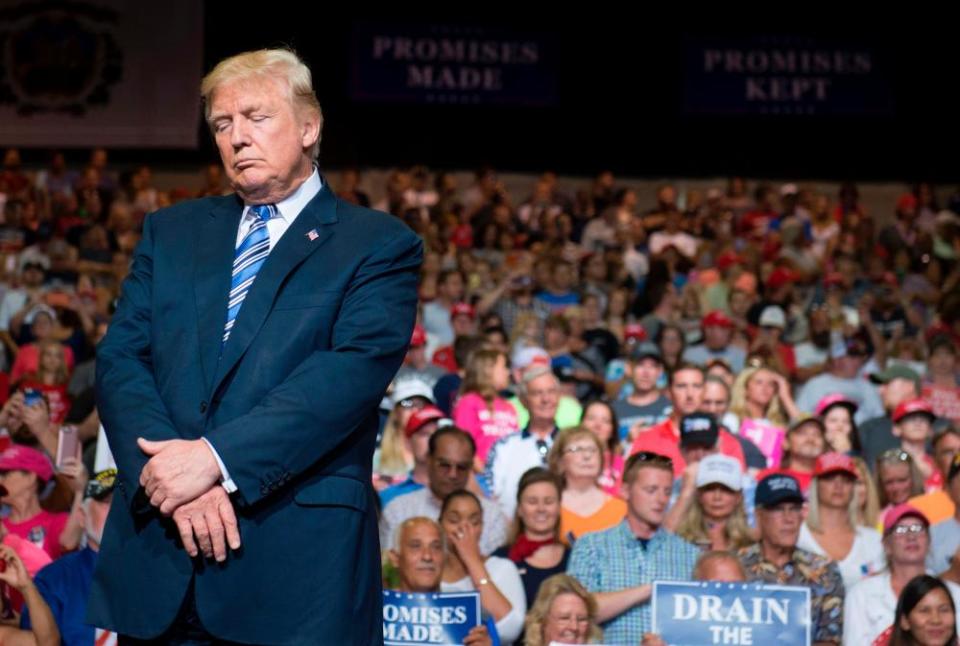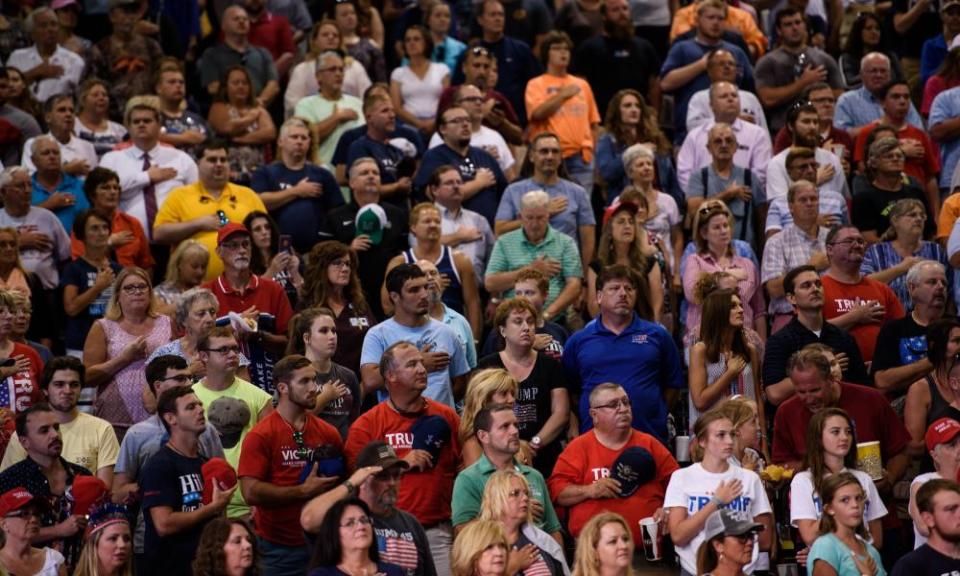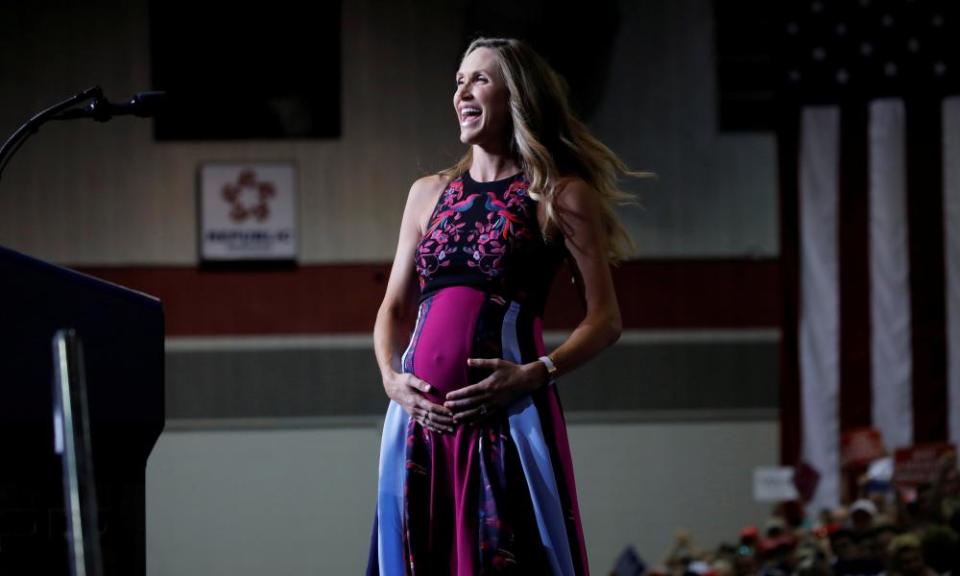Why Trump still needs the love of the crowd: ‘This is like medicine to him’
As storm clouds gathered over the White House, the president retreated to his safe space: a stadium rally to rile his base and celebrate Trump the showman

Country roads, take me home
To the place I belong
West Virginia, mountain mamma
Take me home, country roads
The crowd erupted as John Denver’s 1971 song filled the arena. Behind a black curtain, beneath a blue “Make America great again!” sign, Donald Trump was preparing to make his grand entrance.
“I know when he’s waiting to come out his heart is pounding because he’s coming to a field of love,” said Gene Huber, 47, a former used car salesman who was attending his seventh Trump rally. “The rallies fuel him up.”
Enter the showman, big, besuited, orange-topped, slowly traversing a black ramp to centre stage. The American president was greeted by roars as if for a rock star or sporting hero. He clapped in time to chants of “Trump! Trump! Trump!” from the 9,000-strong crowd. When he held aloft a black sign that said “Trump digs coal”, the cheers somehow became even louder.
The election might have finished nine months ago but Trump is still on the road – and still bashing Hillary Clinton. Thursday night’s rally in Huntington, West Virginia, was his seventh since becoming president, each in a different state that voted for him. With a formidable domestic and foreign policy in-tray waiting for him back at the White House, why does he still do them?
Trump’s ego, his love of televised spectacle, his need for a shot of adrenaline and his hunger for another victory in 2020 are all part of the story, but in Huntington there appeared to be a more utilitarian – some would say sinister – purpose. Hours after it was revealed that special counsel Robert Mueller had convened a grand jury in Washington to investigate the Trump campaign’s alleged collusion with Russia, the president rallied his base against what he claimed is a politically motivated ruse.
“We didn’t win because of Russia; we won because of you,” he insisted. “Have you seen any Russians in West Virginia or Ohio or Pennsylvania? Are there any Russians here tonight, any Russians?”
There was laughter from the spectators. The president warned: “They’re trying to cheat you out of the leadership that you want with a fake story that is demeaning to all of us and most importantly demeaning to our country and demeaning to our constitution.”
The tactic was straight from the playbook he used last year to claim, without evidence, that the election was being “rigged” against him. This time it was a pre-emptive strike to delegitmise those investigating the Russia links – the media, Congress and Mueller – by implying that they are hostile to Trump and therefore, by extension, hostile to his supporters. It was a calculated attack on the anti-Trump elites purportedly once again subverting the popular will.
As ever, the response on the pro-Trump Fox News was instructive. The conservative commentator Charles Krauthammer said: “I think that the appearance that he did in West Virginia tonight is a way of saying, ‘My numbers may be down, but I command a formidable army.’”
Trump followed up the next morning on his Twitter account by highlighting a prediction from another Fox News presenter, Jeanine Pirro, of a national “uprising” if a member of the president’s family is indicted.
West Virginians are always overlooked but he hasn’t overlooked us. The people love him
Lynette Kennedy McQuain
Each Trump rally is a slickly choreographed cavalcade of God, the military, patriotism, politics, baby boomer rock and the magic trick in which a New York billionaire sells himself as a working class hero. As pop concerts and festivals show, digitally saturated culture has done nothing to diminish the public’s appetite for live performance, for breathing the same air as your idol. Trump’s focus on so-called “flyover states” that feel deprived of the action may have been crucial in his election win.
Now the monthly ritual sees roads closed off by police around a music venue or sports arena and a small but determined band of protesters singing and waving signs such as, “Grab Trump by his Putin” and “I know, I know, I stand up for people, I’m such a bitch”. Occasionally Trump supporters standing in line shout abuse, or sing rival songs such as “Build the wall!”. Seldom is there violence.

Inevitably in the global capital of capitalism, the rallies are also a chance to make a buck. On Thursday Frado Smith, 47, had taken a break from selling merchandise at a series of Phish concerts in New York to stand on a street corner hawking “Adorable deplorable for Trump” T-shirts and “Hillary for prison 2016” badges.
“People want to be seen, people want to be heard,” he said. “You can’t do that in your own house.”
Among those wanting to be seen and heard was AC Cordell, 45, a musician. He said of Trump’s motivation for coming: “Part of it is about trying to maintain the hype around the pre-election. There’s been a lot of resistance and negativity but this is like medicine for him. Trump is a rallyer: he loves to build businesses and he loves to build people up too. He relishes the moment to be in the public eye and be the entertainer. He’s a rock star or professional athlete: they all like to get the crowd riled up.”
Lynette Kennedy McQuain, 57, a retail merchandiser, said: “West Virginia could not have dreamed a president would come back to us. West Virginians are always overlooked but he hasn’t overlooked us. The people love him: he connects with the average American. Money doesn’t distance him from the ordinary desires of people. He’s just a man and he just wants what’s best for the country.”
Trump’s demotic self-expression has always been part of the appeal. “He tells it like it is,” has been a common refrain from Trump supporters for two years. McQuain said: “He’s not a politician and I believe when he’s talking he talks like he would at the dinner table. People don’t want political talk. They want someone who understands what they’re going through.”
John Perdue, 49, an unemployed former coal company worker, was wearing a T-shirt with the message: “Trump digs coal. Black gold.” He recalled a campaign rally in nearby Charleston where the then candidate donned a miner’s helmet and pretended to dig. The gesture has been much mocked in the media ever since. But to Perdue it signalled recognition and respect.
“It was just a very special moment to see him put the miner’s hat on and support the miners,” he said. “Hillary was against coal [all] the way. He was the first person who cared about us. He’s very much in touch with the ordinary neighbourhood person that’s trying to make a living.”
‘The rally is its own genre of performance’

Inside the packed venue, signs said “Promises made” and “Promises kept” amid three giant flags bearing the stars and stripes. The playlist booming from loudspeakers included the Beatles, Celine Dion, Elton John and the Rolling Stones. An elderly woman wearing a pink “Women for Trump” T-shirt danced with her husband, earning cheers from a group of young women and girls who swayed to the music while holding “Drain the swamp” placards. Children wore “Make America Great Again” hats. The crowd reflected the local area in its lack of racial diversity.
Warm-up acts included an invocation prayer (“make America good again”); the pledge of allegiance to the flag led by a 93-year-old veteran of Iwo Jima (“our president Donald Trump is making America great again”); a rendition of the Star-Spangled Banner; a sports coach (“he said he would help our coal miners and he has”); a state senator (“he hasn’t let the fake news slow him down”); an ex-marine and farmer (“I appreciate Donald Trump’s down-to-earth manners”); and Trump’s pregnant daughter-in-law Lara.
This man is a good man. He’s got a backbone. He’s got real ideas. He cares about America
Jim Justice, governor of West Virginia
“I’m so proud that I can welcome my son into a world where Donald Trump is our president,” she said.
After his rapturous welcome and a chorus of “USA! USA!”, the president boasted that the stock market was at an all-time high. Why did a crowd in West Virginia, one of the poorest states in the union, celebrate plutocrats on Wall Street? Trump assured them it will be good for their retirement savings: “Have you all been helped? I think so!”
He spoke of reviving “beautiful, clean coal” and yanking the US out of the Paris climate agreement – a line likely to elicit boos in New York or Washington but cause for roars of approval here. And as if from muscle memory, he slammed Clinton over her use of a private email server while secretary of state, eliciting familiar but still shocking jeers of “Lock her up!”
Trump gleefully paraded West Virginia governor Jim Justice who, defecting from the Democrats to the Republicans, said of the president: “This man is a good man. He’s got a backbone. He’s got real ideas. He cares about America. He cares about us in West Virginia. And most importantly of all, you know what, he has made us, as common everyday Americans, feel good and be proud of who we are.”
That last sentence explains much of the Trump phenomenon. As the crowd whooped in awe and admiration, it was hard to believe the president’s worst week – the collapse of healthcare legislation, his communications director uttering profanities and later departing, wayward tweets about transgender troops – had ever actually happened. Offering drama, swagger and the illusion of certainties in an uncertain world, the rallies are vital in sustaining this alternate reality.

Drew Lichtenberg, resident dramaturg and literary manager at the Shakespeare Theatre Company in Washington, said: “Trump understood on some level the campaign rally is its own genre of performance and self-consciously aestheticised it. He’s interested in the form itself of the campaign rally rather than what he’s there to say.”
Lichtenberg compared Trump’s post-election rallies to a provincial touring show trying to recapture the glories of its Broadway run, with the reference to Clinton a “bit” that can be relied on to kill with audiences.
“He obviously enjoyed running for president because of the adulation of the crowd. He enjoys playing the role of president more than being president. He now wants to stage an encore performance of his campaign rallies. It’s a very strange way to govern.”
Trump’s supporters frequently condemn “safe spaces” on university campuses but the rallies are his own safe space, far from the intrigue, factional infighting and Russia investigations in Washington.
Gwenda Blair, a Trump biographer, said: “In front of a rally he has to be a performer. They’re there because he might say something unexpected. That’s what he’s very good at and he’s done it very successfully his whole career. The soundbite, the unexpected lurch, often attacking some sacred cow like John McCain or the pope, showing he won’t stop at anything to defend his people.”
Blair characterised Trump’s language at rallies as typically a blend of incomplete thoughts, simple vocabulary and repetition laced with bullying, threats and grievance.
“That’s a very compelling message,” she added. “That language is about telling you what you want to hear, not the truth and the facts. He’s found it works most of the time in business but not so well from the White House.”

